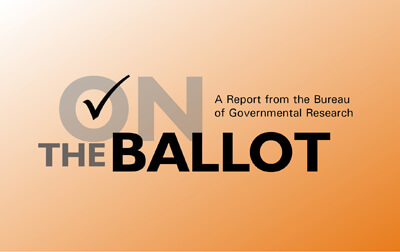
Bureau of Governmental Research slams Cantrell’s affordable housing plan
By Jessica Williams
Source: The Times-Picayune | The New Orleans Advocate
September 27, 2019
The Bureau of Governmental Research has come out against Mayor LaToya Cantrell’s push to expand affordable housing in New Orleans by cutting some property taxes, saying a proposed constitutional amendment lacks detail and could hurt the city’s finances.
The nonpartisan organization said in a report Friday that Louisiana voters should shoot down Constitutional Amendment 4, which would give New Orleans’ government the right to exempt certain owners from all or a portion of their property taxes.
It said Cantrell should have provided more detail ahead of the Oct. 12 election about just who would get the tax breaks and whether there would be a cap on those breaks.
“BGR acknowledges that housing affordability is a genuine and significant concern in New Orleans right now,” the group said in its report. “However, there is not enough detail on how the city would use the new tax exemption for citizens to make an informed judgment of (the exemptions’) potential benefits and impacts.”
The amendment would allow New Orleans to exempt properties with up to 15 residential units from all or part of the property taxes that owners would normally need to pay. The exemptions would apply to taxes that go to the city and various other entities that receive dedicated millages, such as the Sewerage & Water Board and the Orleans Parish School Board.
State lawmakers stipulated this spring that the tax breaks, if approved by voters, could not be awarded to short-term rentals and could not lead to a hike in the overall tax rate. The City Council would need to approve whatever specific exemptions the mayor’s team would decide upon.
Cantrell’s chief of staff, John Pourciau, criticized the BGR report, saying “affordable housing has never been a large concern of BGR” and that the city needs the flexibility that Amendment 4 would provide to do what’s best for its residents.
“This is really a conversation about local authority,” Pourciau said. “Housing affordability and housing quality affect the city in a lot of unique ways, and that’s part of the reason why we want to make sure that we have the authority to create solutions.”
Pourciau has said the city wants to give a tax break both to would-be homeowners who wouldn’t otherwise be able to afford to buy a house and to longtime homeowners victimized by rising property assessments in their neighborhoods. The tax exemptions would also be offered to developers who build affordable housing complexes that have 15 or fewer units, he said.
The cost of a single-family home in New Orleans increased by 46% from 2005 to 2015, according to the New Orleans Metropolitan Association of Realtors, leading to an affordable-housing shortage that advocates claim has reached crisis proportions. More and more residents are being forced from the city’s core to its margins or the suburbs, they say.
The advocacy group HousingNOLA says the city needs a net 1,500 new affordable housing units this year and 33,000 by 2025, far more than current programs provide.
But BGR said the city should have spelled out how it would implement the exemptions before asking voters to approve the amendment. The group criticized the lack of specified limits or eligibility requirements for the breaks, and said tax breaks in general circumvent the city’s budgeting process.
It also said city leaders should have given voters an estimate on how the amendment would affect city finances.
Voters “are asked to approve the amendment now despite open questions about the programs’ scope, eligibility requirements, compliance and accountability measures, and cost from foregone taxes,” the report says.
Pourciau said more specifics in the amendment could hamstring the city’s ability to change its policies later if it needs to.
He also said the new homes that would hopefully be built as a result of such policies would help produce property taxes in formerly vacant areas and help the city offset the revenue it might lose from the exemptions.
Fair Use Notice
This site occasionally reprints copyrighted material, the use of which has not always been specifically authorized by the copyright owner. We make such material available in our efforts to advance understanding of issues and to highlight the accomplishments of our affiliates. We believe this constitutes a “fair use” of any such copyrighted material as provided for in section 107 of the US Copyright Law. In accordance with Title 17 U.S.C. Section 107, the material on this site is available without profit. For more information go to: US CODE: Title 17,107. Limitations on exclusive rights: Fair use. If you wish to use copyrighted material from this site for purposes of your own that go beyond “fair use,” you must obtain permission from the copyright owner.
